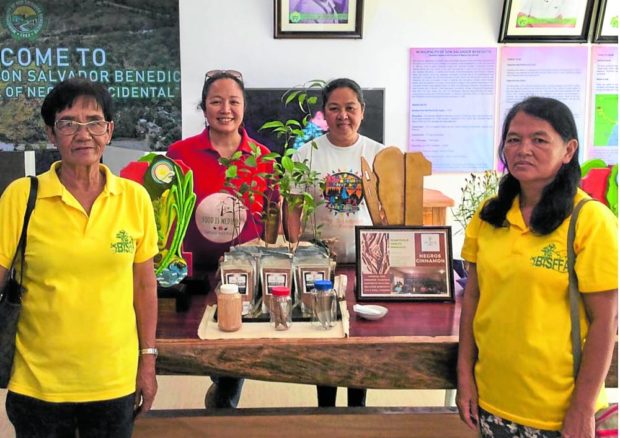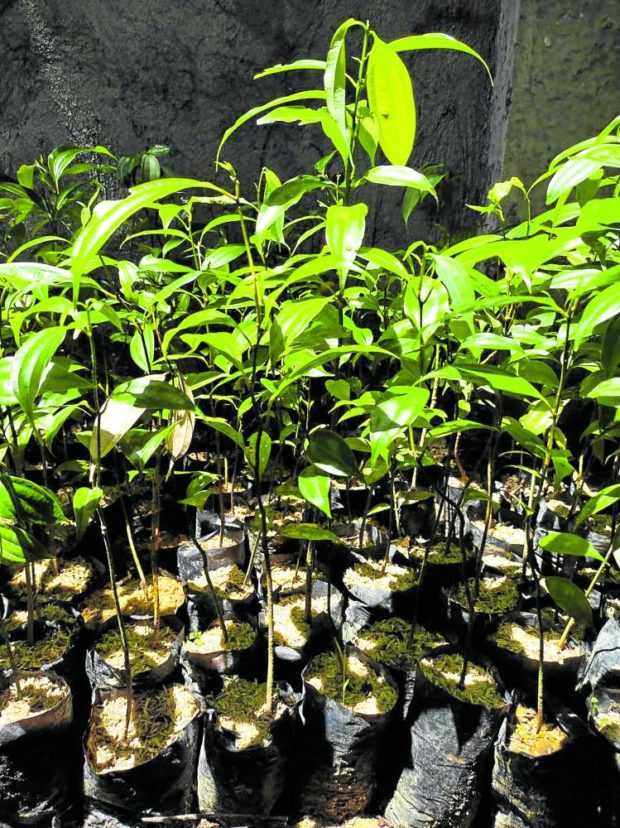Bacolod-based social enterprise champions Philippine cinnamon

ADVOCATES Plantsville Health founder November Canieso-Yeo (in red) with Integrated Social Forest Farmers Association’s leaders —CONTRIBUTED PHOTOS
Cinnamon is among the world’s most important spices, a quintessential condiment that discerning households use to enhance the flavor and aroma of food and beverages. Its essential oil is also widely used for personal care products.
The Philippines has 19 to 21 native species of cinnamon; unfortunately, they are among the endangered species identified by the IUCN Red List of Threatened Species. The country sources 98 percent of its cinnamon requirements abroad.
Bacolod-based social entrepreneur November Canieso-Yeo chanced upon this sad reality after launching a blog to share her lessons and experiences from organic home gardening. Armed with her love for cinnamon’s aroma and flavor, Canieso-Yeo launched in 2018 her advocacy for the conservation of Philippine cinnamon.
Canieso-Yeo is the founder and CEO of Plantsville Health, a social enterprise that champions the conservation of local cinnamon species by planting them with local farmers, buying their produce and developing healthful products based on Philippine cinnamon and other aromatics. Apart from conservation, the social enterprise tackles livelihood, health and climate change issues.
“In the future, we hope to bring in other business models to incentivize the farmers to plant and protect the Philippine cinnamon, like generating payments from carbon credits, getting crowdfunded [for] planting and nurturing the Philippine cinnamon, and exchanging the planting of Philippine cinnamon for computers and internet access for their children,” according to Plantsville Health’s website.
Article continues after this advertisementCurrently, Plantsville Health is working with Integrated Social Forest Farmers Association in Negros Occidental. The social enterprise trained the local farmers with the assistance of the Negros Occidental Provincial Environmental Management Office and forestry expert Ariel Tutor.
Article continues after this advertisementSince 2018, 76 farmers have sown 14,133 Philippine cinnamon seedlings with the help of Plantsville Health. Prior to its entry into the community, it was estimated that only 50 mother trees remained. Locals used to cut down cinnamon trees to turn them into uling or charcoal; but now, they are actively participating in the conservation efforts.

Native cinnamon seedlings.
Plantsville Health found seven cinnamon species in the town of Don Salvador Benedicto. These are seen as important scientific findings as they established where these species naturally grow in the Philippines.
Canieso-Yeo says the Philippine cinnamon bark can be harvested sustainably from the tree using a peeling technique and coppicing. In woodland management, coppicing refers to the traditional method of cutting trees to ground level to encourage new shoots. The trees don’t die; on the contrary, they regenerate with 10 times more stems and leaves.
Plantsville Health emerged as one of the grand winners of the Social Innovation Challenge for Agriculture hosted by nonprofit organization World Vision Philippines in 2019. It won the Department of Trade and Industry’s Moonshot Trabaho, Negosyo, Konsyumer Pitching Competition last year.
It was also a recipient of the Department of Science and Technology’s Women Helping Women: Innovating Social Enterprise Program. The social enterprise was among those that represented the Philippines in the recently concluded Belt and Road Summit held in Hong Kong.
Plantsville Health is among the enterprises that will participate in the forthcoming Negros Trade Fair happening on Sept. 20 to 25 at Glorietta Activity Center in Makati City. Organized by the Association of Negros Producers, the 36th edition of the Negros Trade Fair—the longest-running provincially organized trade fair in the country—marks the return of its in-person format.
During the event, various Plantsville Health products will be showcased, including the Philippine cinnamon planting kit, cinnamon coco sugar, cinnamon moisturizing sanitizer, cinnamon mouthwash, cinnamon sleep aromatic water and cinnamon massage oil.
As more consumers buy local cinnamon, more farmers are encouraged to plant the trees to harvest the bark and leaves, says Plantsville Health. The social enterprise also hopes that more Filipinos will know that we have native cinnamon species and grow them in their gardens and farms.